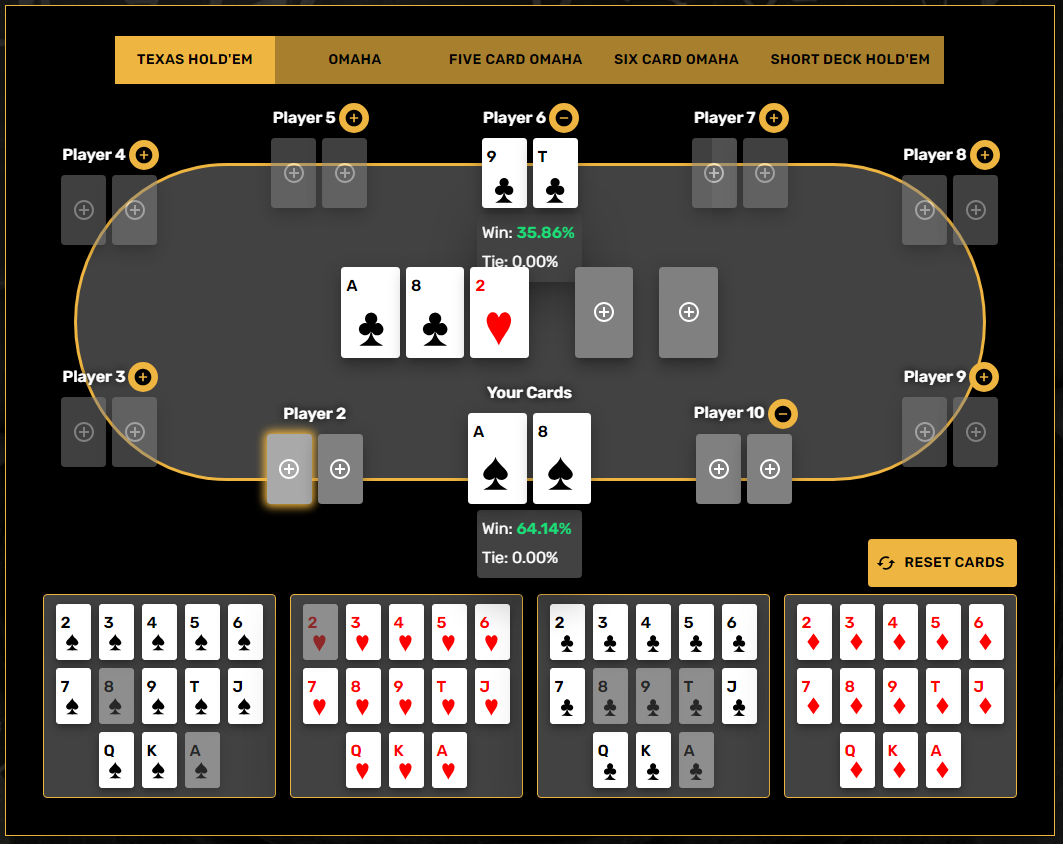Poker has gained immense popularity over the years, attracting millions of enthusiasts worldwide. With this growing interest comes the long-standing debate: “Is poker luck or skill?” In this article, we will explore both aspects of the argument, carefully examining the role of luck and skill in the game, discussing the perspectives of computer programs and AI, and delving deeper into various poker strategies and their effectiveness.
The Role of Luck in Poker
When playing poker, the aspect of luck cannot be entirely disregarded, as it often plays a significant role in determining the outcome of individual hands and sessions. Every poker player, from casual enthusiasts to seasoned professionals, experiences the influence of luck to varying degrees.
However, professional poker players mitigate by developing strategies to impact luck on their overall performance, allowing them to maintain consistent success in the long run. In this section, we will explore the role of luck in playing poker and examine how it affects the way people play poker, participate in a poker tournament, and engage in various aspects of the game. Players have the opportunity to test their luck by exploring various online casinos like online casino Australia for real money.
Short-Term Variance and Luck
There’s no denying that luck is a factor in poker. The cards are distributed randomly, and even the most skilled poker gamers cannot always control the outcomes of their hands. In the short term, luck can play a significant role in the results of individual games or sessions, making poker gambling seem like an appropriate term.
For example, when playing poker, even a professional poker player holding pocket aces can fall victim to bad luck if their opponent catches a miracle card on the river. However, this luck aspect affects both amateurs and top poker players alike. It’s essential to understand that luck plays a role in poker, but its impact might be less pronounced over the long term.
The Role of Probability in Poker
Probability is a fundamental concept in poker, and understanding the odds can help players make better decisions at the poker table. While it is impossible to predict the exact cards that will be dealt, players can calculate the probability of certain outcomes, such as the likelihood of completing a flush draw or hitting a set with pocket pairs. This understanding of probability allows players to weigh the risks and rewards of their decisions, helping them navigate the unpredictable nature of the game.
The Impact of Luck on Different Poker Variations
Different poker variations may emphasize the element of luck to varying degrees. For instance, Texas Hold’em may have a higher luck factor than Omaha or Seven Card Stud due to the community cards and the increased potential for big hands.
Understanding the luck factor in each poker variation can help players adapt their strategies and expectations accordingly. Players should also watch out for bad luck as it can affect the desired game results.
The Role of Skill in Poker
While luck plays a part in poker, the game involves a significant degree of skill, making it stand out from pure chance-based games like slot machines. To consistently succeed and play poker profitably, players must develop a wide range of abilities and master various strategic concepts.
Unlike games of pure chance, poker is a game where the outcome can be significantly influenced by the decisions players make. In this section, we will delve into the many aspects of poker that make it a game of skill and examine the strategies employed by successful players to overcome the uncertainty of the game.
Strategic Thinking and Decision Making
While luck is undoubtedly a factor in poker, the role of poker skill cannot be overlooked. Poker is a game of skill that requires a deep understanding of strategy, mathematics, and psychology. Poker gamers must be able to read their opponents, make educated decisions, and adjust their play based on various factors.
Top poker players consistently win money in poker tournaments and cash games, demonstrating that their success is not solely reliant on luck. The ability of professional poker players to mitigate the impact of luck and take advantage of their skillset is a testament to poker’s status as a skill-based game.
For instance, playing poker involves calculating pot odds and making decisions based on the probability of winning a hand. This strategic thinking is crucial for consistent success in poker, and it is a skill that can be developed over time.
Poker Psychology
One of the most important skills in poker is understanding and exploiting the psychological aspects of the game. This includes reading opponents, recognizing their tendencies, and adjusting your play accordingly. By carefully observing an opponent’s behaviour, a skilled poker player can gain valuable information that can be used to make better decisions at the poker table.
Moreover, mastering your own emotions and maintaining composure during high-pressure situations is essential for making optimal decisions and avoiding costly mistakes. Developing strong mental resilience can help poker gamers stay focused and adapt to the ever-changing dynamics of the game.
Bankroll Management
Another crucial skill for poker gamers is bankroll management. Understanding how to manage finances and make informed decisions about buy-ins, stakes, and game selection can significantly impact long-term success. Proper bankroll management helps mitigate the inherent risks associated with poker gambling and reduces the impact of short-term variance on a player’s finances.
Hand Selection and Position
Poker is a game of skill, and a fundamental aspect of “poker skill” is knowing which hands to play and which to fold, depending on the situation. Skilled players understand the importance of position at the poker table and recognize that some hands are more profitable when played from late positions. Developing a solid understanding of hand selection and position can greatly improve a player’s overall win rate.
The Computer Programs and AI Perspective
The emergence of advanced computer program and artificial intelligence (AI) has further emphasized that poker is predominantly a game of skill. These cutting-edge technologies have been designed to analyze, learn, and implement strategies that enable them to compete with and even outperform human players.
Here, we will explore how computer programs and AI have impacted the world of poker as a game of skill, and what their development means for the future of this skill-based game.
Unbeatable Poker AI
The development of computer programs and artificial intelligence (AI) in poker has further reinforced the notion that poker is a skill-based game. Unbeatable poker AIs have been developed that play near-perfect games, achieving success through learning from billions of poker hands and making optimal decisions in every possible situation.
These AI programs have proven that, with the right strategy, poker can be mastered, and the element of luck can be significantly reduced. Moreover, many poker players use AI and software to improve their game and refine their strategies on various online poker sites.
The Emergence of Poker Training Software
As AI and computer programs continue to advance, many poker players have turned to train software to help improve their skills. This software can provide real-time feedback, analyze hand histories, and suggest optimal plays based on complex algorithms. By utilizing these tools, players can gain a deeper understanding of poker strategy and make more informed decisions at the poker table.
The Role of AI and Computer Programs in Online Poker
Online poker has grown exponentially in recent years, and the use of AI and computer programs has played a significant role in shaping the online poker landscape. Many online poker sites have implemented security measures to prevent the use of prohibited software, ensuring a fair playing environment for all users.
However, the increasing influence of AI and computer programs on poker strategies has raised questions about the future of the game and whether human players can continue to compete with machines.
The Balance of Luck and Skill in Poker
In the world of poker, both luck and skill contribute to the overall outcome of the game. Striking a balance between these two factors is crucial for players who wish to achieve consistent success.
We will examine the interplay between luck and skill, discuss how they influence both short-term and long-term results, and explore how players can maximize their potential by adapting to various situations.
Short-Term vs Long-Term Results
Ultimately, both luck and skill play a role in poker, with each factor affecting short-term and long-term results differently. In the short term, luck can have a significant impact on a player’s results, as individual hands and sessions can be heavily influenced by the cards dealt.
However, over the long term, a skill often outweighs luck as players who consistently make better decisions will ultimately come out ahead. This is why top poker players can make a living from the game, while casual players may experience more fluctuations in their results.
Adaptability and Game Selection
Adaptability is key, as successful poker players must continually refine their strategies and adjust to changing circumstances at the poker table. This includes recognizing when to switch between different poker variations or adjusting one’s playing style based on the skill level of opponents.
Also, game selection plays a vital role in balancing the influence of luck and skill in poker. Choosing games that are the easiest to win and formats that emphasize skill over luck can help players maximize their potential for success.
The Growing Popularity and Global Appeal of Poker
While the debate between luck and skill in poker continues, the game’s global popularity has only grown, attracting players from all walks of life. The intriguing balance between chance and strategy makes poker accessible to newcomers while also providing a rich and rewarding experience for dedicated players looking to develop their abilities.
As poker continues to evolve, the game has found a home in both brick-and-mortar casinos and online platforms, offering players numerous opportunities to test their skills and enjoy the thrill of competition. Furthermore, poker has become a spectator sport, with major tournaments like:
- World Series of Poker (WSOP)
- World Poker Tour (WPT)
The diverse range of poker variants, from Texas Hold’em to Pot-Limit Omaha, allows players to choose the game format that best suits their skills and preferences, ensuring that the game remains engaging and challenging for all.
Conclusion
The eternal debate of whether poker is a game of pure luck or skill may never be definitively resolved, as both factors play a role in the game. However, the evidence suggests that skill has a more significant impact on long-term success, as demonstrated by the consistent results of top poker players and the advancements in AI and computer program analysis.
By acknowledging the role of both luck and skill, players can focus on honing their abilities while embracing the unpredictable nature of the game. So, whether you’re an aspiring pro or just looking to have some fun on online poker sites, remember that success in poker requires a delicate balance of skill, strategy, and a little bit of luck. Happy playing!









